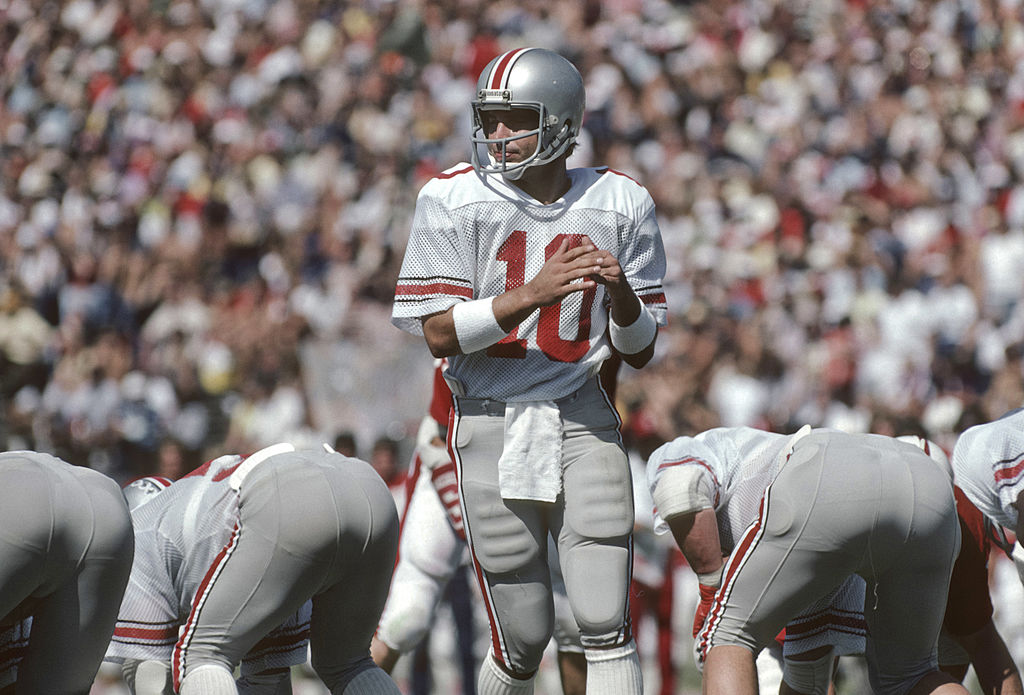NCAA
Art Schlichter's Tragic Addiction Story Has Landed Him in More Than 44 Different Jails and Prisons

Art Schlichter is the classic story of the man who had everything and threw it all away. Schlichter played quarterback at every level and was a star at the position from high school through his four years at Ohio State University. At Ohio State, however, there were rumblings of some gambling habits that ultimately became the downfall of his career and his life. Like many gambling addicts, Schlichter became a chaser which led to a life of stealing and prison.
Art Schlichter a star at Ohio State
Art Schlichter’s gambling habits began when he was a high-profile quarterback at Miami Trace High School in Ohio. Schlichter began going to racetracks with his good friend and teammate Bill Hanners, whose family trained horses. He was heavily recruited as a high school quarterback and seemed to have it all - good looks, athleticism, popularity, and a bright future ahead of him.
Schlichter didn’t have any fear and was very confident in himself. “He'd take a curve on a gravel road at 60 when we should've been going 30,” Hanners said back in 2006. “I'm not going to say he thought he was invincible, but there was always that edge.” Schlichter went on to play college ball at nearby Ohio State University and was a star. In three of his four seasons as the Buckeyes quarterback, he finished in the top six in the Heisman Trophy Award voting.
Schlichter was the fourth player selected in the 1982 NFL draft, taken by the Baltimore Colts. In his rookie season, he played in just three games before he was suspended for the 1983 season for gambling. In 1984 and 1985 he played in a combined 10 games for the Indianapolis Colts. During his very brief and very ineffective NFL career, Schlichter threw three touchdown passes and 11 interceptions.
The beginning of the downfall
It all began with innocent bets on horses when Art Schlichter was in high school. Although the legal betting age in Ohio was 18, Schlichter's high school friend, Bill Hanners said that never was a problem when the two would spend time at the local racetrack, Scioto Downs. ”My mom would bet for us,” Hanners said back in 1983, the year Schlichter was suspended by the NFL for gambling. ”If I had $10 to bet, it seems like he would have $50.”
In 1983, Schlichter's base pay was $140,000 as a backup quarterback for the Colts. According to Federal court documents, he lost $159,000 in a week. He began cooperating with the FBI after bookies threatened to expose him to the Colts if he didn't pay his debts. He lost $400,000 just betting on basketball games that season.
In 1987, Schlichter was arrested for being part of running a multi-million dollar sports-betting operation. He had been trying to return to the NFL, but commissioner Pete Rozelle intervened when the Cincinnati Bengals attempted to sign him as Boomer Esiason's backup in 1987 because of his latest arrest.
Schlichter's troubles continued
Between 1987 and 1992, Schlichter was arrested three times for writing bad checks. In his 2009 biography, Busted: The Rise and Fall of Art Schlichter, Schlichter noted he was sentenced to two years in prison in 1995 after passing bad checks at casinos. He was released after 16 months, only to be arrested again for stealing checks from his employer. Between 1995-2006, he spent a total of 10 years behind bars in a total of 44 different jails or prisons.
Schlichter reunited with a woman named Anita Vatko Barney whom he had met after speaking at a church about his addictions. Barney was the widow of the co-founder of Wendy's. Schlichter conned her out of millions of dollars he used to create a sports ticketing scheme. In 2011, Schlichter was again arrested and sentenced to 10 years in prison for fraud.
While under house arrest awaiting assignment to state prison, Schlichter tested positive for cocaine. Schlichter's public defender, Steven S. Nolder, said the former quarterback was examined by three mental health specialists. They determined he had “significant deficits” in the frontal lobes of his brain. Nolder argued those deficits were likely caused by multiple concussions and helped force him into bad decisions.











